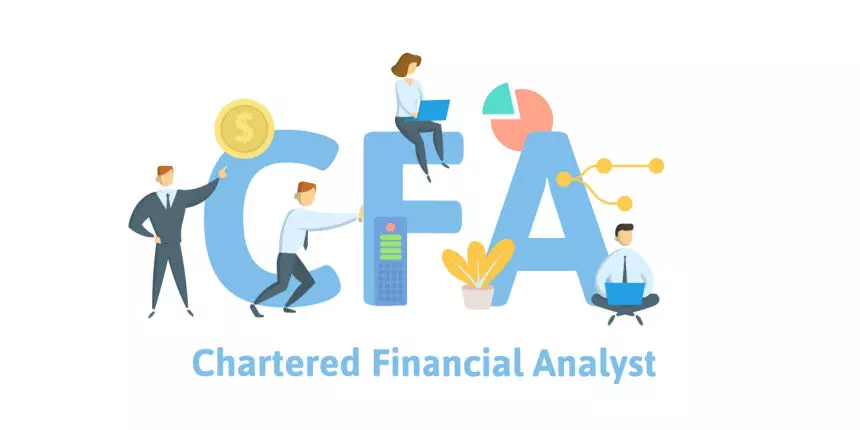The full form of CFA is the Chartered Financial Analyst. It is a nationally recognised professional certification offered by the CFA Institute to assess and credential the expertise and integrity of financial experts as an international, non-profit professional association. It is one of the most valued-after career opportunities for investment professionals, regarded a gold standard in the area of investment research, and a globally renowned distinction in finance.

Eligibility criteria to become CFA
For an individual to become a CFA, he is supposed to complete all 3 levels of the Chartered Financial Analyst Exam held by the CFA institute which is level I, II, & III. Three levels of the CFA course should be completed and the time is about 1.5 years. After finishing the course, the students will receive the CFA certificate. Excluding level I, the three exams are held once a year in June, as they could also be conducted in December. The candidate who wishes to become a CFA must have the necessary qualifications which are,
- Candidates who wish to take the course should have a Bachelor’s degree or must be in their bachelor’s degree curriculum last year.
- The applicant must have a minimum of four years of relevant job experience.
- The applicant should have a blend of a total of 4 years of professional experience & education.
Work Profiles for CFA
- Investment Analyst: Analyzes financial data to make investment recommendations for asset management firms or investment banks.
- Portfolio Manager: Oversees investment portfolios, optimizing returns and managing risk for investment firms.
- Financial Planner: Helps individuals and families create financial plans, including investment and retirement strategies.
- Risk Analyst: Assesses financial risks for banks and insurance companies, developing risk management strategies.
- Private Equity Analyst: Evaluates investment opportunities in private companies, conducting due diligence and valuation.
- Corporate Finance Manager: Manages financial operations and planning within companies, optimizing capital structure.
- Fixed Income Analyst: Specializes in analyzing bonds and provides fixed-income investment recommendations.
- Equity Research Analyst: Analyzes stocks and provides investment recommendations for research firms or banks.
- Quantitative Analyst (Quant): Uses mathematical models to develop trading strategies and risk solutions for financial firms.
- Financial Consultant: Provides personalized financial advice to clients, aiding in achieving financial goals.
Famous CFA institutes or colleges in India
- CFA Institutes (Chartered Finance Analyst Institute), Mumbai
- IIBMs (Indian Institute of Business Management and Studies), Mumbai
- Narayan Institute, Gujarat
- MIFM (Mansukh Institute of Financial Markets), New Delhi
- CIIMS Raipur (Central India Institute of Management Studies), Chhattisgarh
Benefits of Earning the CFA Designation
- Expertise and Knowledge: CFAs have a deep understanding of finance, investment, and ethics.
- Career Advancement: CFAs have a competitive edge in finance job markets.
- Global Recognition: The CFA designation is respected worldwide.
- Networking: CFA Institute membership provides a global professional network.
- Ethical Foundation: CFAs prioritize ethical conduct and client interests.
- Competitive Advantage: CFAs excel in roles requiring investment and risk expertise.
- Versatility: CFAs work in various finance sectors.
- Higher Earnings: CFAs often earn more than non-designated professionals.
- Continuous Learning: Maintaining the CFA requires staying updated with industry trends.
- Effective Decision-Making: CFAs make informed financial decisions.
- Fiduciary Responsibility: CFAs prioritize client interests.
- Job Security: The CFA designation offers stability in uncertain economic times.
- Personal Growth: Earning the CFA fosters discipline and dedication.
Conclusion
In conclusion, the Chartered Financial Analyst (CFA) designation is a prestigious and globally recognized credential that signifies a high level of expertise in finance and investment management. CFAs undergo rigorous education and testing to acquire the designation, and they are equipped with the knowledge and skills needed to excel in various finance-related roles.
FAQ's About CFA
CFAs are skilled in a wide range of financial disciplines, including investment analysis, portfolio management, risk assessment, and financial planning.
To become a CFA, you must pass a series of three challenging exams administered by the CFA Institute and meet the institute’s work experience requirements.
The CFA program typically takes a minimum of three years to complete, as there are three exams, each offered once a year.
The CFA exams are known for their difficulty and rigor. They consist of multiple-choice questions, item set questions, and constructed response (essay) questions.
Related posts:
- AMC Full Form: Benefits, Components, Needs, Advantage
- ORS Full Form: Dehydration, Myths, Flavors, Varieties & Facts
- PCC Full Form: Importance, Types, Application Process
- PAN Full Form: Legal Provisions, Regulations,
- BRB Full Form: Productive, Routine, Distractions
- MCD Full From: Introduction, Responsibility, Challenges
- CT Scan Full Form: Scans, price, Advantages
- USA Full Form: History, Economics,Technology, culture




















